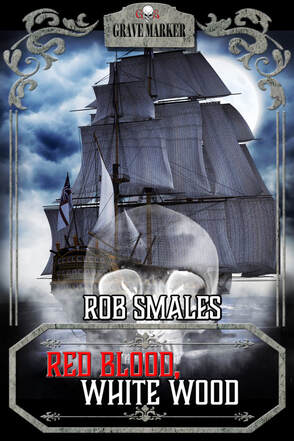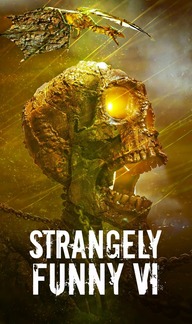 Rob Smales is the author of Echoes of Darkness, which garnered both a five-star Cemetery Dance Online review and a 2016 Pushcart nomination. With over two dozen short stories published, his story “Photo Finish” was also nominated for a Pushcart Prize and won the Preditors & Editors’ Readers Choice Award for Best Horror Short Story of 2012. His story “A Night at the Show” received honorable mention on Ellen Datlow’s list of the Best Horror of 2014, while “Death of the Boy” and “In Full Measure” made the same honorable mentions list for 2016. Most recently, he edited the dark humor anthology A Sharp Stick in the Eye (and other funny stories) for Books & Boos Press, and released the coming of age horror novella Friends in High Places with Bloodshot Books. When did you first begin writing stories? August 9, 2010. I know, because I still have the file. I wrote a single scene, just to see what it would be like. I eventually expanded that scene into a short story, a—if you can believe this—romantic comedy that no one will ever, ever see. But it did all start with a scene about a young man picking up a girl for a date, written just for myself, back in August of 2010. On your website, you state that you write character-driven dark fiction. Would you elaborate on that? Sure! I’m a pantser—or discovery writer if you’re feeling fancy—which basically means that when I sit down to write, almost nothing about the story’s set in stone. I have a starting point and a proposed ending, and I just start writing my way there. Along the way I meet my characters, become acquainted, and see them in action. Just like you get to know the people around you by observing what they say and do, I do the same with the people in my head. And just like it strikes you as odd if someone you know does something out of character—say your mom started snarfing down a Skippy on whole wheat sandwich, when you know she has a peanut allergy—it strikes me as odd if these new friends of mine start doing things that are out of character for them. If it strikes me as odd, it’ll strike my readers as odd, and that will give that temporary suspension of disbelief thing we fiction writers rely so heavily on a serious poke, and pull the readers out of the story. Take the mother in the above example: if someone told you she was eating that peanut butter sandwich, and you knew about her nut allergy, your first reaction is to say “I don’t believe it!” That’s the kind of reaction I’m trying to avoid. If it were her brother, however—and we all know he has a serious love for Skippy—it wouldn’t raise any eyebrows. What if someone had a gun to the brother’s head and told her he’d die if she didn’t eat that sandwich. Would she eat it then? Of course! That’s the way I write my stories. Along the way to the intended destination, everything that happens has to fit the characters involved. If none of the characters would do a thing that needs to happen in my story, I either have to change the circumstances so they would (the gun to his head above), or change the story itself to make it fit the characters. The story becomes driven by the in-character actions of those characters. Sometimes that means the ending can even change, a new one rising up propelled by the characters themselves. How did you get the idea for "Do I Fat?" I’m a mailman by day, and I have a lot of customers. I used to have a woman who received registered packages with stunning regularity, and whenever she did would give me a packet of cookies while signing the receipt. Eventually I told the cookie lady, “Please, you don’t have to do that. I’m going to get fat.” The cookie lady is an elderly emigrant from the former Soviet Union, and though her English is about a billion times better than my Serbo-Croatian, she looked up at me and said, in an accent worthy of Mr. Chekov, the original Star Trek helmsman, “But you walk all day. You walk, you sweat. You sweat, you lose weight. I work in bakery. Hard work. I sweat.” She raised spindly arms to showcase her spindlier body. “Do I fat?” I had to admit that she did not. But her little speech stuck with me—I love accents, and might easily listen to her tell stories for hours—and I’d recently read something that had reminded me of Baba Yaga, the witch of Russian folklore who appears in so many tales, though is best known around these parts as the child-munching cannibal in Hansel and Gretel. I started wondering what it would be like if Baba Yaga had survived to the modern age. Would she fit in? Would she still be up to her old kid-eating tricks? Would she, in fact, fat? Now we know. As a side note, a couple of months after having that little conversation, shortly after I’d written my first draft of “Do I Fat?”, the cookie lady took that day’s receipt into her apartment to sign and was gone for longer than usual. When she returned, she handed me the signed slip . . . and an apple. Apparently, I had been right all along, and I do fat. Do you have an essential book on the craft of writing that you would recommend to others? The only book on writing I’ve read is On Writing, by Stephen King. I read it because I love King’s work, and his style, and also because it was entertaining as hell, but I wouldn’t call it essential. Much of what he actually says about writing is more general than specific, more guidelines than rules—which might be a result of his basic belief that writing can be learned, but it can’t be taught. People come at this writing thing from so many different angles, no one book will work for everyone, and he’s pretty upfront about thinking that. I believe that as well, so to my way of thinking no book is essential. If you don’t like King or his style of storytelling, then it’s definitely not the book for you. If you do like King, then read it for fun, but don’t go into it assuming it will make you a better writer—though it may help. So, essential? No. Recommend? Sure, if you like him, pick up a copy of On Writing, because:
 Who is your favorite author and what really strikes you about their work? I’ve mentioned loving King's work, but my favorite book of all time is A Prayer for Owen Meany, by John Irving, and I’ll tell you why. It’s the story of someone’s life—Owen Meany’s, of course—and is written that way, with lots of scenes and little stories that don’t really seem to have a goal, or even anything in common other than their having to do with the title character. That’s how we live: some stuff happened yesterday that has nothing to do with some of the stuff that’s happening today, and all of that really has nothing to do with some of the things that will happen tomorrow, other than that they’re part of our ongoing lives. Irving managed to write all these disparate parts in such a way that they’re all interesting, all fun, and you never sit there wondering Jesus Christ, where the hell’s he going with all this? Then you get to the end of the book, and all those loose threads he’s left lying all through the story, he starts pulling them tighter. He tugs on this scene, then that one, and your perception of them begins to shift—and then, like one of those optical illusion puzzles where if you look at a pattern just right it resolves into a picture, and instead of seeing just a random bunch of colored dots you’re suddenly looking at the face of Jesus, or Hendrix, or John Lennon, every scene that’s come before that used to seem unconnected sort of lines up and falls into place in your mind, and you see that everything--everything—that’s come before was actually all aimed toward this exact point in Owen’s story. You draw in a deep breath of wonder, and it comes out through rounded lips in a sigh that sounds suspiciously like “whoa . . .” I want to do that. Someday, I want to do that. Who is your greatest cheerleader? I have a few cheerleaders, each great in their own way, and it would be insulting and unfair to choose one above the rest. How’s that for a political answer? What's next for you? The next thing I have coming out is a small standalone not-quite-a-novella, the next installment in Grinning Skull Press's Grave Marker series, Red Blood, White Wood. This little pirate story is a tale of murder, mist, and magic, and will be available in the Kindle store on June 27 for just 99 cents.
1 Comment
|
Welcome!
Mystery and Horror, LLC, is an indie press interested in what the name suggests. Contact us at: [email protected]
Archives
October 2023
Categories
All
|

 RSS Feed
RSS Feed